|

News Brief Archives
|
|
News Briefs Archives
January 9, 2005 - March 19, 2005 |
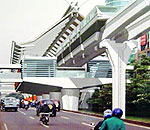 |
|
Technology switch in Jakarta?
(3/19/05)
Jakarta, Indonesia. Money woes in Jakarta may lead
to Hitachi losing another major monorail contract outside of
Japan. According to a Jakarta Post story, the Jakarta administration
is unwilling to get involved with financing the project. However,
the government has said that it would probably provide fare subsidies
to keep ticket prices affordable for Indonesian citizens. PT
Jakarta Monorail had asked the city government for $60 million
as an "equity injection," and for an annual subsidy
of $20 million for a period of eight years. The technology issue
was discussed by City Secretary for Development Affairs, Hari
Sandjojo. Sanjojo told the Jakarta Post that the $650 million
Hitachi technology is "too expensive for us. It would be
better for us to look for other technologies that are cheaper."
They are reportedly looking at cheaper technologies from South
Korea and China. This would be the second technology switch on
the project. Earlier, Malaysia's MTrans lost out on the project
because of differences over administration demands to build two
line simultaneously. That's when Hitachi was turned to for the
project. Earlier this month PT Jakarta Monorail said that it
would speed up construction, but little progress has been evident
since groundbreaking. Despite all the reported turmoil of the
project, both the company and administration are claiming the
project will stay on schedule.
City
may subsidize monorail fares. Jakarta Post, 3/19/05.
|
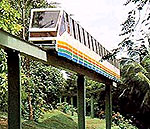 |
|
Last run of Von Roll monorail
on Sentosa Island (3/16/05)
Sentosa Island, Singapore. After twenty-three years
of dutifully carrying passengers, the Sentosa Island Monorail
made its last run on Tuesday night. The train's driver announced,
"Everybody sit tight, the last monorail journey will be
departing." The 6.4 km loop had six stations on the resort
island. The Von Roll-built monorail will be replaced another
system called the Sentosa Express. The Sentosa Express is a concrete
beam monorail that will connect Sentosa to the Harbour Front
MRT station within six minutes. Construction is under way for
the new monorail, which will feature the first Hitachi Small
monorail trains. Since the announcement of the old monorail's
closure was made last week, ridership doubled as people came
for one last ride. One driver said the monorail is "really
old and we have to give it a rest. Quite a lot of people who
came to Sentosa will miss this train very much; I can feel it
from the bottom of my heart."
Sentosa's
monorail makes final journey after 23 years. Channel Asia
News, 3-16-05.
|
 |
|
DestiNY USA project includes
monorail plan (3/7/05)
Syracuse, New York. Another fanciful hi-tech "resort
of the future" is being planned, and this time the location
is Syracuse, New York. The plans are grandiose, yet many people
and companies are showing faith in the concept by lining up to
participate. DestiNY USA expects to draw in excess of 20 million
visitors annually. The massive resort will included 150 acres
of enclosed green park space. Green is a key word, in that plans
call for DestiNY USA to operate entirely free of fossil fuels.
Competing consortiums of leading energy companies will provide
the power for DestiNY USA. The transportation plan includes an
automated parking structure for 50,000 cars, as well as a Personal
Rapid Transit (PRT) system and monorail to connect with Hancock
International Airport. In December of 2004 DestiNY USA closed
on a loan of nearly $700 million to be used for the first stage.
Additional financing is currently underway. Opening of phase
one is slated for 2007.
DestiNYUSA website
|
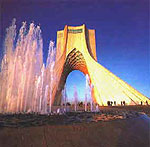 |
|
Monorail information sought
for Tehran (3/7/05)
Tehran, Iran. Attention monorail manufacturers,
yet another city is considering monorail and wants detatiled
information! The Monorail Society (TMS) has received several
communications from Rail Transportation Industries (RTI) of Tehran,
Iran regarding monorail. The company was set up in 2001 to implement
several rail projects for Iran. One of those projects is monorail
systems for the traffic-choked city of Tehran. RTI is currently
seeking information from monorail manufacturers to help plan
for these sytems. For further information please contact:
M.R. Mohammadbagher
Managing Director& Member of Board
Rail Transportation Industries
9th Floor, Nasr10 Building, Mahestan Street,
Iranzamin Avenue, Shahrak Gharb
Tehran, Iran 14658 31135
email: info@rti-gc.com
|
 |
|
Jakarta Monorail money troubles
(3/4/05)
Jakarta, Indonesia. Barely after ground has been
broken, the Jakarta Monorail has run into financial problems.
Monorail builder PT Jakarta Monorail asked the city to guarantee
its loan repayments, to give it an annual subsidy worth $20 million
for seven to eight years and also asked the city to pay $60 million
into the project as equity. They also wanted to charge vehicles
driving along the monorail corridors using and electronic system.
City officials rejected the requests on Thursday, saying that
they would burden the people. Two monorails lines were to be
built in Jakarta, worth US $650 million. The first line would
be 14.3 kilometers long. Hitachi Monorail is the selected technology.
Under the current agreement, the monorail project is entirely
a privately funded enterprise. Jakarta Monorail Director Ruslan
Diwirjo said the government assistance is needed to convince
potential investors that the project is receiving full support
from the Indonesian administration. Discussions are continuing
between monorail and government officials.
City
Council stalling monorail over money. Jakarta Post, 3/4/05.
|
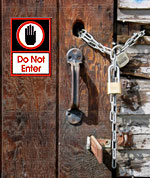 |
|
Pressure mounting for Seattle
Monorail Project (3/2/05)
Seattle, Washington. Restless in Seattle! That
could be a title for a movie, but right now it's a description
of the current atmosphere in Seattle monorail circles. The Seattle
Monorail Project (SMP) received a sole bid from Cascadia Monorail
in August of 2004, and from that point forward the agency and
Cascadia have been quiet as to details regarding ongoing negotiations.
Now that six months have passed, many are wondering if progress
is being made or if the project is in trouble. News reports of
cost difficulties, efforts to increase tax monies for the project,
accusations of excessive spending by SMP, unhappiness with the
secrecy of the negotiations, and a recent highly publicized showing
of interest by Team Monorail for a reopening of the bid process
have all added to an atmosphere of "what the heck is going
on with the monorail?" In a recent statement, SMP says "It's
important to remember that negotiating the Design Build Operate
Maintain (DBOM) contracts for the Monorail Green Line is inherently
complex and time-consuming." The statement points out that
Cascadia Monorail is an international team of about 30 companies
and that "Multi-party negotiations means that progress is
sometimes slower than we'd like even though the negotiations
are proceeding as they should." Be that as it may, anxiety
levels of monorail backers continue to increase and monorail
detractors are seizing the opportunity to spread more criticisms
about the project.
Questions
and Answers about Green Line Negotiations. Seattle Monorail
Project, 2/25/05.
Cascadia Monorail
website (Hitachi technology)
Team Monorail website
(Bombardier technology)
|
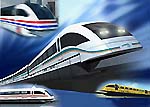 |
|
Munich Transrapid project
one step closer. (3/2/05)
Munich, Germany. Europe is one step closer to being
the next continent with a Transrapid maglev monorail system.
German Rail (DB) has applied to the German Federal Railway Authority
(EBA) for planning approval for the 37 kilometer line that would
link Munich's main station with the city's international airport.
The step includes submitting documentation for the first two
of a total of five line sections. According to officials, this
marks a decisive step in DB's plans to implement the project.
DB head Hartmut Mehdorn says, "The route between
Munich's main station and its airport is perfect for a maglev
system, and growth in the region and expansion of the airport
provide ideal conditions for a profitable maglev service. We
will now commence in-depth planning and, at the same time, start
negotiations with the industry to ensure continuation of the
project. These results are decisive to its implementation."
Processing normally takes around 18 months, final permission
to build the maglev line should be granted sometime during 2006.
Munich airport connector
website
TMS Maglev Monorail Page
|
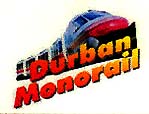 |
|
Durban moves forward on monorail.
(2/23/05)
Durban, South Africa. Several years ago The Monorail
Society (TMS) reported a plan for monorail in the port city of
Durban, South Africa. Not much has been heard since, but recent
government pronouncements indicate that the city is still seeking
to build a people mover system. The line would link Durban tourist
attractions such as uShaka Marine World, Suncoast Casino and
the Durban International Convention Centre. The idea has popular
support from all political parties on the council. Hotels on
the beachfront are also promising to subsidize the line. Suncoast
Casino has already pledged R70 million towards the construction
of the system, estimated to cost R220 million. A local survey
found that 51% of people interviewed prefer a monorail system
as opposed to 9% for a surface "road train." Different
technologies are being assessed in an effort to find a system
that can be built for R23 million per kilometer.
People-mover
plan takes step forward. Independent Online, 2/23/05.
Durban official
website
|
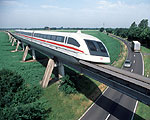 |
|
Spectacular new Transrapid
proposals (2/20/05)
Berlin, Germany. German-developed Transrapid Maglev
Monorail technology is gaining more backers and believers as
each week goes by. Some proposals garner noticeable attention,
while others quietly gain momentum behind the scenes. One very-public
proposal came to light this week in the United Kingdom. Going
by the name Ultraspeed UK Project, the proposal was given extensive
coverage by the press as the Ultraspeed website premiered. The
proposal is for a line to run from London to the north, stopping
at major cities on its way to Scotland. Prime Minister Tony
Blair is said to give approval for studies for maglev, having
been impressed by experts at a recent seminar at Downing Street.
Backers suggest that because the United Kingdom has not invested
in conventional high-speed rail as its neighbors in mainland
Europe, they have the opportunity to leapfrog into the future
with the latest and faster technology. Another proposal for Transrapid
came to light this week, this one for the Middle East. A spokeswoman
for Transrapid International said that a feasibilty study will
look into an amazing 800-kilometer maglev line from Bahrain to
the United Arab Emirates (UAE) via Qatar. A memorandum of understanding
on the maglev study could be signed when German Chancellor Gerhard
Schroeder visits the region within two weeks. Conventional
high-speed rail is also in the running for the link. Meanwhile,
Shanghai's Transrapid maglev continues to operate successfully,
proving the technology's capabilities to anyone considering high-speed
rail. Transrapid maglev monorails are capable of speeds of over
500 kph (300 mph).
UK Ultraspeed
Project website
Ultraspeed
proposal video. BBC 2 video news feature, 2/17/05. Requires
Realplayer, excellent 15 minute
feature (forward to 30 minute mark in video).
300mph
train for north-south link. The Guardian, 2/18/05.
Transrapid
to study Gulf rail link. Transrapid to study Gulf
link, 2/15/05.
Transrapid International
website
Transrapid USA website
The Monorail Society Maglev Monorail
Pages
|
 |
|
Another Metrail proposal in
India. (2/17/05)
Chandigarh, India. Metrail India Private Limited
is proposing a monorail system for the tricity area of Chandigarh,
Panchkula and Mohali. A light rail system has been under consideration
by government officials, but monorail monorail proponents point
out that monorail would increase the capacity of transit along
the line, rather than diminish it by taking up surface space.
Metrail is a state-of-the-art monorail system using hybrid motors
and a completely new bogie configuration. Since electric power
is generated entirely onboard the trains, expensive electrical
subsystems and track infrastructure aren't required. One monorail
train creates about the same amount of pollutants as a four-passenger
automobile, yet a two-car train system can carry five to ten
thousand passengers per hour. A test track is located in Malaysia
and featured in The Monorail Society's DVD Monorails
of Malaysia. During a presentation to government officials,
Zafar Saifullah, Chairman for Metrail India, pointed out
that Metrail would cost approximately $10.3 million per kilometer
vs. $48 million per kilometer for a surface rail system.
Monorail
answer to city's traffic problems? Chandirgarh Newsline,
2/16/05.
The Monorail Society's Metrail Photo
Essay in Special Features
Metrail Website
|
 |
|
Konya Chamber wants monorail.
(2/16/05)
Konya, Turkey. The Konya Chamber of Industry recently
contacted The Monorail Society (TMS) in an effort to gain more
information on monorails. Seyfi Suna, EIC Head Office
Manager for the Chamber, tells us they are very interested in
establishing a monorail for public transport in the city. Konya
is one of the biggest cities in Turkey, with over one million
inhabitants living in the city center. The city currently has
an old trolley system. Suna says "We propose monorail because
it will give a perfect aesthetic appearance to the city and we
are confident that as an industrial city, we will be in a position
to manufacture most of the system by ourselves." They are
currently in the research and feasibility study phase. The Chamber
recently acquired the popular TMS DVDs, Monorails
of Japan and Monorails of Malaysia
as part of their research effort. Suna says they are now awaiting
responses from manufacturers of monorails they've contacted through
the TMS Manufacturer Page. Monorail
manufacturers, they would like to hear from you soon!
Konya Chamber of Industry
website
|
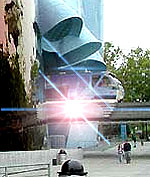 |
|
Seattle contract talks continue.
(2/16/05)
Seattle, Washington. Contract talks between the
Seattle Monorail Project (SMP) and Cascadia Monorail began six
months ago today. Cost-cutting efforts have been under way to
help make the project come to fruition. The Seattle Times is
reporting that Cascadia Monorail's bid came in around $200 million
higher than expected. The public debt for the 14-mile project
is limited to $1.5 billion. The SMP doesn't want to return to
voters for additional funds, so they are reportedly cutting back
on items such as extravagant stations. Contract talks are being
held in private, so details of Cascadia's proposal have not been
revealed yet. One monorail board member is expressing concern
over the final look of the project. Cindy Laws told the
Times that she is disappointed by aspects of the design and thinks
the public might also be disappointed as well. Team Monorail,
the Bombardier-led consortium that dropped out of the bidding
process before the deadline last year, has recently expressed
a desire to be part of a suggested reopening of the bid. A spokesman
for Team Monorail says that the group can build the Green Line
for close to the original cost estimate. Cascadia Monorail executive
Six Silva says more time is needed to finish the contract
because the monorail is an extraordinarily complex project. Cascadia's
team includes Hitachi, Washington Group International and Fluor
Enterprises.
Monorail
bid tops projection by $200M. Seattle Times, 2/16/05.
|
 |
|
4,000!
(2/3/05)
Fremont, California. The Monorail Society (TMS)
reached yet another milestone this week with the addition of
our 4,000th member. Members of the sixteen-year old organization
are made up of a diverse mix of professionals, promoters, inventors
and fans. Interestingly, member #4,000 is the manager of a Chamber
of Industry in a major city in Europe/Asia. He tells us that
his organization is interested in establishing a monorail system
in the city. They are currently in the start-up and feasibility
study phase and have found The Monorail Society website to be
informative. The chamber is purchasing TMS DVDs to gain further
information on monorails (available in the Monorail
Store). Thanks to you, the members of TMS, we continue to
grow and spread the good word on monorail! |
 |
|
Short circuit in Las Vegas.
(2/3/05)
Las Vegas, Nevada. The Las Vegas Monorail was shut
down for a mechanical problem on Wednesday for the fourth time
since first opening in July of 2004. The system was closed for
13 hours as a result of a short circuit on a 30-foot section
of the busbar just north of the Las Vegas Hilton station. The
glitch was discovered before the normal opening time of 7:00
AM. Service resumed at about 7:40 PM. Las Vegas Monorail spokesperson
Todd Walker said "This is something that occurs on
all electrically powered transportation systems. As we become
more experienced with operating the system and dealing with this
type of event, this sort of event will be far less of a problem."
Cause for the short circuit has not been determined yet.
Monorail
halted again by glitch. Las Vegas Review-Journal, 2/3/05.
Testing
process may have led to excessive monorail wear. Las
Vegas Sun, 2/3/05.
Will
struggling monorail end up in taxpayers' lap? Las Vegas Mercury,
2/3/05.
|
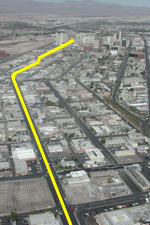 |
|
No federal funds for Las Vegas
extension. (1/27/05)
Las Vegas, Nevada. The rough start up of the Las
Vegas Monorail may have prevented downtown from getting a 2.3-mile
extension soon. Federal authorities have told Regional Transportation
Commission (RTC) officials that they won't fund the downtown
leg this year. According to Las Vegas Mayor Oscar Goodman,
"Unfortunately, because of the breaks they've had in the
beginning, they haven't been able to demonstrate reliability
to justify funding." However, Las Vegas Monorail spokesman
Todd Walker said, " Nothing is finalized until it's
finalized, you can't rule anything in and anything out."
The extension would run north from Sahara Station to a new station
near the Fremont Street Experience in downtown, with three stops
along the way. The RTC has already received a $22 million federal
grant, which was spent on preparatory work for the extension.
Mayor Goodman and downtown businesses were hoping the monorail
extension would help with the revitalization of the area, which
in recent decades has been overshadowed by the rapid growth and
success of "the Strip," which sits outside of city
boundaries. The first 4-mile segment was built using private
grants and more than $400 million in bonds. Farebox revenue was
to be used to repay a $143 million taxpayer-funded loan for the
extension, along with a $178 million federal grant.
Funding
denial puts monorail extension in doubt. Las Vegas Review-Journal,
1/27/05.
U.S.
Won't Fund Vegas Monorail Extension. Las Vegas Sun, 1/26/05.
The Monorail Society Las Vegas Monorail
page (includes map of extension proposal)
|
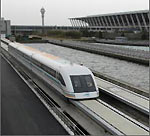 |
|
Maglev extension approved
in China? (1/26/05)
Beijing, China. According to various Chinese news
sources, the government of China has approved the construction
of a US$3.6 billion extension of the Shanghai Maglev. The Transrapid
maglev from Pudong International Airport to Shanghai will be
extended by 170 kilometers and will be jointly funded by the
central Chinese and local governments. The system will be extended
to Hangzhou. The current Shanghai Maglev operates at speeds up
to 430 kph (270 mph) and has garnered much attention from other
government officials around the world interested in high-speed
connections between cities. The success of Transrapid in China
enhances the chances of similar systems being built elsewhere.
Construction could begin this year and completion is planned
for 2009.
Shanghai-Hangzhou
high-speed railway approved. Xinhua online, 1/26/05.
Transrapid website
Transrapid USA website
 1/28/05. Reports are now coming
out denying an agreement for the extension. Which Chinese reporters
do we believe? 1/28/05. Reports are now coming
out denying an agreement for the extension. Which Chinese reporters
do we believe?
Maglev
report stopped in its tracks. Xinhua online, 1/27/05,
|
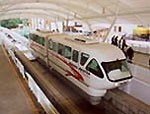 |
|
Tire blast injures three on
KL Monorail. (1/22/05)
Kuala Lumpur, Malaysia. Three members of a family
were injured when a defective tire exploded on the Kuala Lumpur
Monorail. The train had just pulled out of the Chow Kit Station
when the blast happened under their monorail seat. A woman suffered
injuries on her leg, while her daughter and daughter's friend
received injuries to their hands. A statement from the driver
said "The tire burst caused a rubber sidewall to flap and
hit the side cover of the seat resulting in the leg injury to
a passenger on the seat." An investigation is under way.
Burst
tyre, believed to be defective, cause of monorail blast on Friday.
The Star, 1/22/05.
KL
Monorail incident: 'Fault lies with a burst pneumatic tyre.
New Strait Times, 1/22/05.
|
|
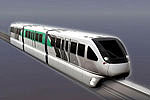
New train for Team Monorail
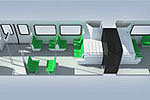
Bombardier train with walk-through.
(art renderings courtesy of Team Monorail)
|
|
Bombardier not giving up on
Seattle. (1/18/05)
Seattle, Washington. In a recent letter to Seattle
Monorail Project (SMP) board members, Denis Bouvette,
Vice President of Bombardier's Total Transit Systems Division,
wrote "we are suggesting that SMP re-visit the current procurement,
reissue or modify the RFP with the changes we are suggesting,
and invite Cascadia and Team Monorail to submit proposals."
Bouvette went on to say that Team Monorail withdrew from the
competition last year because "our sureties were unwilling
to allow us to accept the joint and several liability required
in the RFP documents. And second, the last set of major changes
that SMP had made through the RFP addenda combined to require
additional time to complete the proposal." To up the ante
in their effort to be brought back in to the project process,
Team Monorail has also revealed more details of their proposal
on a recently revamped website. Their futuristic-looking M-series
trains now incorporate walk through trains with a walkway located
to one side of the bogie compartment between cars. Bouvette's
letter also emphasizes that the drive train problems of the Bombardier
M-VI trains in Las Vegas have been successfully corrected and
that ridership has been strong since reentering service. That
said, Team Monorail states that Seattle trains would have a "completely
different bogie and drive train design." The SMP has been
negotiating with Hitachi's Cascadia Monorail since the fall of
2004.
Team Monorail Website
(Bombardier)
Cascadia Monorail
Website (Hitachi)
Seattle Monorail Project
|
 |
|
Colorado I-70: state says
highway, not monorail (1/13/05)
Denver, Colorado. Colorado transportation officials
are sticking to their belief that a high-speed monorail is not
the way to solve highway congestion from Denver to Vail. Their
vision is for more pavement, by widening Interstate 70 through
the busy mountain corridor. Last month the state released a draft
environmental review that favors widening I-70, while rejecting
both a high-speed monorail or a conventional rail line as too
costly. In the first of ten public hearings on the I-70 mountain
corridor study, almost 200 people showed up Wednesday to voice
their opinion. Most of them favored monorail and said
CDOT's idea to widen the highway will be outdated when completed
by 2025 as proposed. A plan for a Colorado
High-Speed Monorail using inverted-T rail technology lost
steam when Colorado voters turned down money for a test track
in 2002. That proposal was described derogatorily as a "Disneyland
ride" by Governor Bill Owens, which helped sway voters
against the ballot measure.
Monorail:
State not on board. Denver Post, 1/13/05.
Colorado Monorail website
http://www.coloradomonorail.com/
|
|
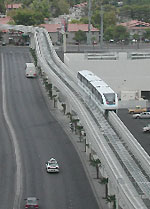
"The Venetian bypass"
Harrah's/Imperial to Sands Ave.
|
|
CES in LV: riders, riders
riders! (1/9/05)
Las Vegas, Nevada. As predicted, the Consumer Electronics
Show is testing the Las Vegas Monorail to the limit. The good
news is that the monorail is passing the test with flying colors.
One impressed conventioneer told KVBC TV's reporter Alex Savidge
"It's crowded, but it's fast, the doors open, people know
what to do and how to do it, and the ticketing is easy. I would
buy stock in that company!" Since the monorail started collecting
fares two weeks ago, over one-half million tickets have been
sold. During the show they are averaging around 50,000 riders
per day, so many that they are now dispatching all nine trains
along the four-mile line. That's 50,000 people not getting on
congested streets in air-polluting taxis or buses. "The
monorail running is definitely making a dent in a very busy traffic
flow pattern," said Erika Yowell, a spokeswoman with
the Las Vegas Convention and Visitors Authority. Hotels that
backed the monorail are now seeing the benefit, as more and more
people become aware of where the stations are. Staff at hotels
where owners vehemently fought the development of the monorail,
such as the Venetian Resort, are having to tell their guests
by the thousands they need to go elsewhere to get on board. As
many in The Monorail Society predicted, visitors to Las Vegas
are starting to book hotels with easy access to the system.
Conventioneers
boost monorail receipts. Las Vegas Review-Journal, 1/8/05.
Las
Vegas Monorail adds more trains to handle convention crowds (online
video). KVBC TV, 1/8/05.
|
| |
|
 / News
Briefs Archives / News
Briefs Archives |




















